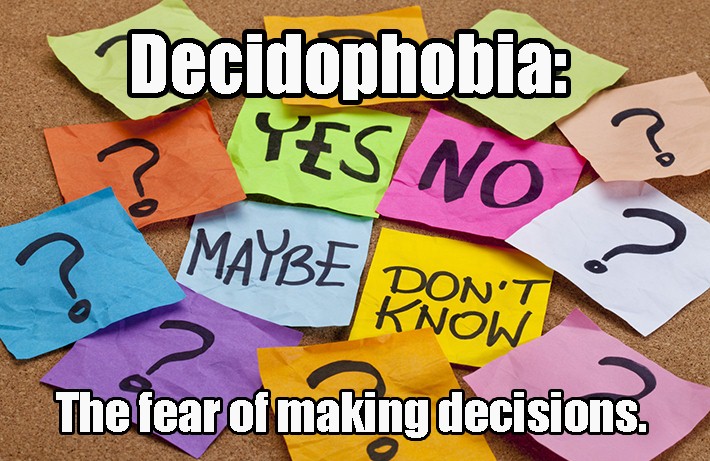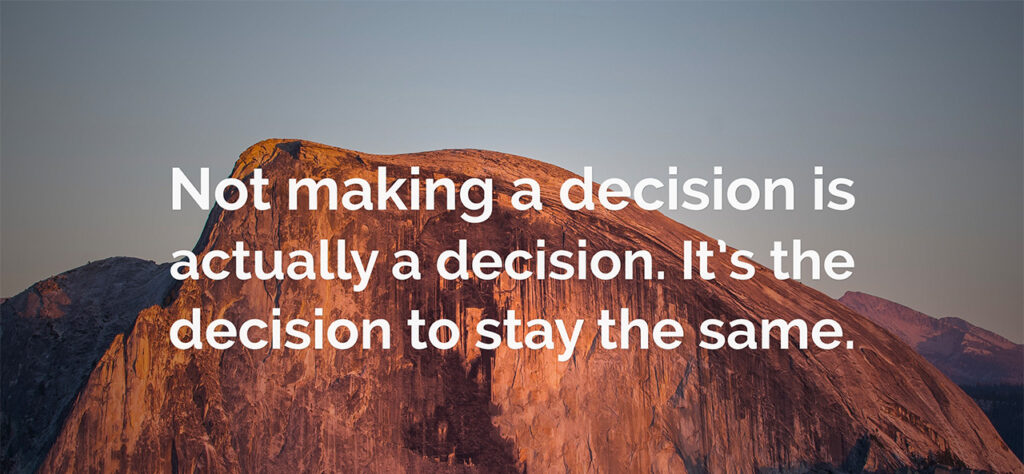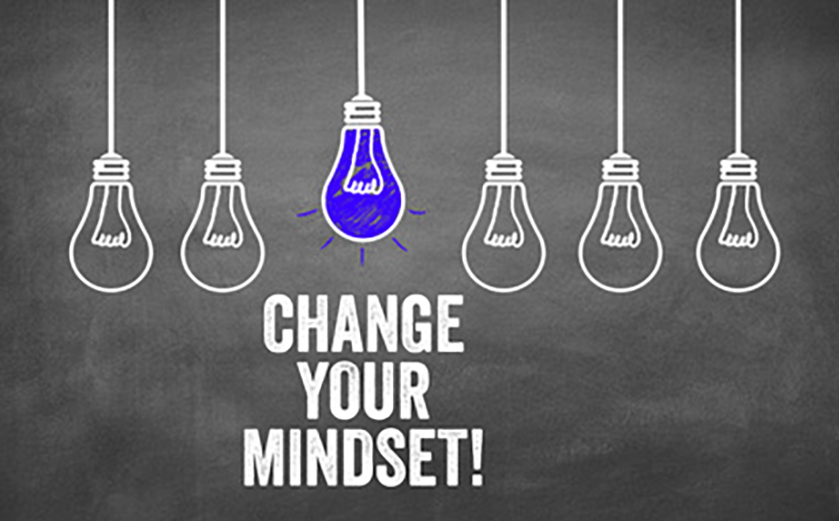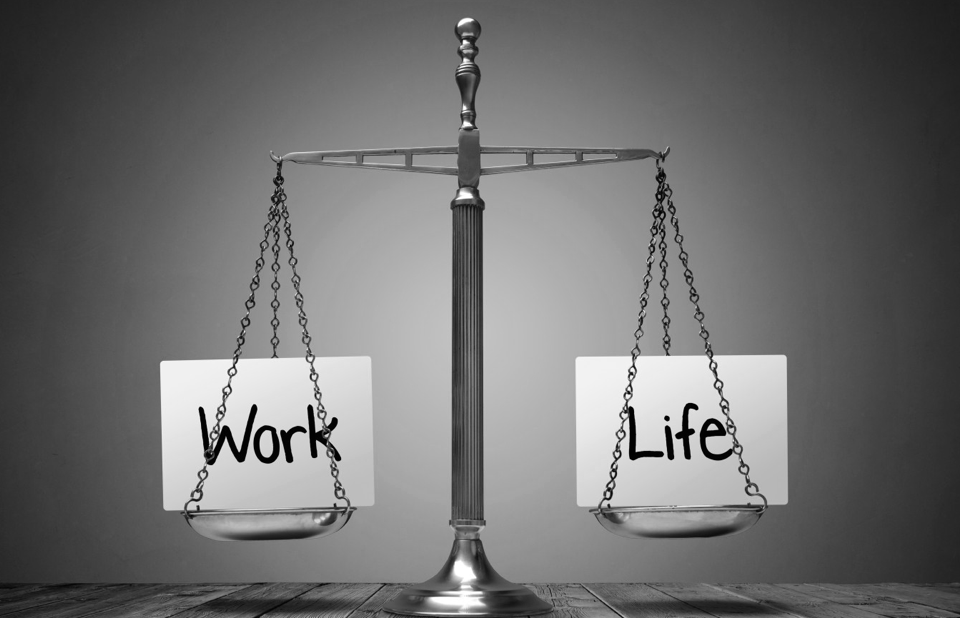Decision making can be a tricky thing.
Sometimes, it can feel like we have too many options, and we’re not sure which one to choose. But what if we took it to the extreme?
Meet decidophobia, the fear of making decisions.
This might sound like a bit of a joke, but trust me, it’s a real thing.
When you have decidophobia, even the most mundane decision, like what to eat for dinner, can feel overwhelming. You might procrastinate, avoid making decisions altogether, or find yourself stuck in a cycle of indecision which can add even more stress to your life and lead to anxiety and panic attacks.
For example, imagine you’re out shopping for clothes and you can’t decide between two outfits. One is more comfortable, but the other is more stylish. You try them both on multiple times, but you just can’t make up your mind.
Or, you’re at a restaurant with friends, and you can’t decide what to order. You end up going with something safe or something one of your friends ordered, even though you’re not really in the mood for it.
Sound familiar?
Don’t worry, you’re not alone.

Decidophobia, also known as atychiphobia, is the irrational fear of making decisions.
This fear can manifest in many ways and can range from mild anxiety to severe panic attacks. People with decidophobia may experience a range of symptoms including:
- procrastination
- avoidance
- indecision
- difficulty in making even small choices.
This fear can greatly impact your daily life and can affect relationships, work, and overall well-being.
Decidophobia can develop for a variety of reasons.
Some possible causes include:
- Trauma or past negative experiences: People who have experienced traumatic events or negative experiences related to decision making may develop a fear of making decisions in the future.
- Perfectionism: People who have high expectations for themselves and their decisions may experience anxiety when making choices, as they fear making the wrong decision.
- Lack of self-confidence: Individuals who lack self-confidence in their abilities may fear making decisions, as they may doubt their own judgement.
- Cognitive or behavioral patterns: People who tend to ruminate or overanalyze decisions may find it difficult to make a choice, leading to indecision and fear.
- Genetic or biological factors: Research suggests that there may be a genetic component to certain phobias, including decidophobia. Additionally, imbalances in certain neurotransmitters such as dopamine and serotonin can also contribute to the development of phobias.
On the last point, studies have shown that there may be a genetic component to certain phobias, including decidophobia. It’s possible that people who have a family history of anxiety disorders or phobias may be more likely to develop decidophobia themselves.
Additionally, research has also suggested that there may be a link between certain genes and the development of phobias, specifically genes that are involved in the regulation of the brain’s response to stress and anxiety.
Imbalances in certain neurotransmitters such as dopamine and serotonin can also contribute to the development of phobias. When these neurotransmitters are not functioning properly, it can lead to increased anxiety and fear, which can contribute to the development of decidophobia and other mental health challenges.
The best treatment or course of action for decidophobia will depend on the individual and the severity of their symptoms.
Some commonly used treatment options include:
- Cognitive Behavioral Therapy (CBT): This type of therapy focuses on identifying and changing negative thought patterns and behaviors that contribute to the fear of making decisions.
- Exposure therapy: This therapy involves gradually exposing the individual to the source of their fear in a controlled setting, with the goal of reducing their fear and anxiety over time.
- Mindfulness-Based Therapy: This type of therapy emphasizes on developing the individual’s ability to focus on the present moment, rather than dwelling on the past or worrying about the future, which can be beneficial for people with decidophobia.
- Medication: Anti-anxiety medication or antidepressants may be prescribed to help manage symptoms of decidophobia. It’s important to note that medication should always be used in conjunction with therapy for the best results.
- Self-help techniques: People who have mild decidophobia can benefit from self-help techniques such as journaling, exercise, and relaxation techniques like deep breathing, meditation and yoga.
- Coaching: working with a coach that specializes in decision-making and phobias, can be beneficial. The coach can help the person to understand their fear, develop coping mechanisms, and work on building their confidence and decision making skills.
It’s important to find a treatment plan that works best for the individual, and that may involve a combination of therapy, medication, and self-help techniques. It’s also important to find a coach or counselor who can help with treating phobias and anxiety disorders.
It’s worth noting that decidophobia is often comorbid with anxiety disorders, such as Generalized Anxiety Disorder (GAD) and Social Anxiety Disorder (SAD). People who have these disorders may have difficulty making decisions because they are overly worried about the outcome.
Comorbidity refers to the presence of two or more disorders at the same time, and it’s quite common for people with decidophobia to also have other anxiety disorders.
In GAD, people experience excessive and unrealistic worry about everyday events or activities, and the fear of making decisions can be one of the things that they excessively worry about. People with GAD often have a hard time making decisions because they are overly worried about the outcome, even when the decision is not particularly important.
SAD is a fear of being judged or evaluated negatively by others and it can also be related to decidophobia. People with SAD may have a hard time making decisions because they are afraid of what others will think of them, or they might avoid making decisions altogether to avoid the possibility of negative judgment.
It’s difficult to say which one comes first as the relationship between these disorders is complex. Some people may develop decidophobia first, and then go on to develop GAD or SAD, while others may develop GAD or SAD first, and then develop decidophobia as a result.
In some cases, the disorders may develop simultaneously, and it’s important to note that the treatment for comorbid disorders should address all of the conditions present.

Decision making can be a tricky thing, but it’s an essential part of life.
Without the ability to make decisions, we would be stuck in a never-ending cycle of indecision and procrastination. But, let’s be real, making decisions can be hard work!
So, why is it so important to be able to make decisions? Well, for starters, it can greatly improve your quality of life.
Think about it, every decision we make, big or small, shapes our life. Whether it’s deciding what to wear in the morning, what to eat for lunch, or where to go on vacation, each decision leads us down a different path.
And when we make good decisions, we open ourselves up to new opportunities and experiences.
If you were to sit down I’m sure you could think of a few of your own, but here are a few random decisions that you might have to make on any given day.
- What to wear: This might seem like a small decision, but it can have a big impact on how you feel throughout the day.
- What to eat for breakfast: Should you have a bowl of cereal, a smoothie, or something more substantial like an omelette?
- How to get to work: Should you drive, take the bus, or bike?
- Whether to go to the gym or not: Do you have the energy to work out or should you take it easy today?
- What to have for lunch: Should you go out to eat or bring your own?
- What to do during your lunch break: Should you take a walk, read a book, or catch up on emails?
- What to do after work: Should you go for a run, meet up with friends, or relax at home?
- What to have for dinner: Should you cook something from scratch or order in?
- What to watch on TV: Should you catch up on a show you’ve been meaning to watch or something new?
- Whether to go to bed early or stay up late: Should you get a good night’s sleep or squeeze in some extra time to do something fun?
- What to wear to a meeting: Should you dress casually or in more formal attire?
- Whether to take on a new project at work: Should you take on the extra workload, or focus on completing current tasks?
- How to handle a difficult work situation: Should you speak to your manager, go to HR, or try to resolve the issue on your own?
- How to handle a difficult client or customer: Should you confront them directly, or try to find a diplomatic solution?
- How to invest your money: Should you invest in the stock market, real estate, or a savings account?
- What to do with your tax refund: Should you save it, pay off debt, or treat yourself to something fun?
- How to handle a financial emergency: Should you dip into your savings, take out a loan, or ask for help from family or friends?
- How to budget your money: Should you prioritize saving, or focus on paying off debt first?
- Whether to lease or buy a car: Should you pay a higher monthly rate for a new car, or save money by buying used?
- How to handle a business decision: Should you expand your business, outsource some of the work, or focus on streamlining your current operations?
- Whether to take a mental health day: Should you go to work and push through, or take the day off to focus on your well-being?
- How to manage stress: Should you meditate, exercise, or take a relaxing bath?
- How to handle a toxic relationship: Should you end the relationship, or try to work through the issues?
- How to prioritize self-care: Should you focus on your physical health, mental health, or both?
- How to handle a difficult family member: Should you cut off contact, or try to maintain a relationship?
- How to deal with work-life balance: Should you prioritize work, or make more time for personal and family activities?
- How to manage time: Should you make a schedule, or take a more relaxed approach?
- Whether to seek professional help: Should you talk to a therapist, or try to work through issues on your own?
- How to handle guilt after taking time for yourself: Should you beat yourself up for it or learn to let go and focus on your well-being?
- How to handle guilt after saying no to someone: Should you feel guilty for not meeting their expectations or learn to set boundaries?
These are just a few examples of the many decisions we make on a daily basis.
While some might seem insignificant, they can all add up to shape our daily experiences. The key is to be mindful of your decisions and to choose what is best for you and your well-being.

When you overcome your fear of making decisions, you open yourself up to new opportunities and experiences.
You’ll be able to make choices that align with your values and lead a more meaningful and purpose-driven life.
Imagine being able to make decisions with confidence, knowing that you’re choosing what’s best for yourself. You’ll be able to set goals and work towards achieving them, without the constant fear of making the wrong decision holding you back. You’ll also be able to establish healthier relationships and have a better work-life balance.
When you’re able to make decisions, you’ll be able to pursue your passions and live a life that is true to yourself. You’ll have the freedom to shape your life in the way you want, without the fear of making the wrong choice.
Dealing with decidophobia, or the fear of making decisions, can be a difficult and challenging process.
But the rewards can be life-changing.
If you’d like to have an honest, constructive conversation about your fear of making decisions, or the anxiety that comes with it, I’d love to help so please feel free to reach out! 🙏 😃










